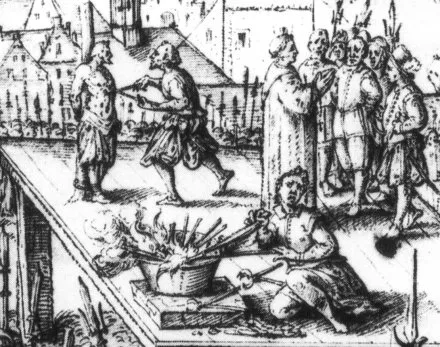If people today had the courage of the Swiss in the 1500s, we would all be a lot healthier and there would be fewer criminal medicos
The more things change, the more they remain the same. Doctors in the 1500s were every big as genocidal and venal as many in the profession are today. The difference is they paid for their crimes
Hat tip to @JackStr42679640 on Twitter who shared this amazing snippet of history.
Geneva / Switzerland
"When the bubonic plague struck Geneva in 1530, everything was ready. They even opened a whole hospital for the plague victims. With doctors, paramedics and nurses. The traders contributed, the magistrate gave grants every month. The patients always gave money, and if one of them died alone, all the goods went to the hospital.
But then a disaster happened: the plague was dying out, while the subsidies depended on the number of patients.
There was no question of right and wrong for the Geneva hospital staff in 1530. If the plague produces money, then the plague is good. And then the doctors got organized.
At first, they just poisoned patients to raise the mortality statistics, but they quickly realized that the statistics didn't have to be just about mortality, but about mortality from plague.
So they began to cut the boils from the bodies of the dead, dry them, grind them in a mortar and give them to other patients as medicine. Then they started dusting clothes, handkerchiefs and garters. But somehow the plague continued to abate. Apparently, the dried buboes didn't work well.
Doctors went into town and spread bubonic powder on door handles at night, selecting those homes where they could then profit. As an eyewitness wrote of these events, "this remained hidden for some time, but the devil is more concerned with increasing the number of sins than with hiding them."
In short, one of the doctors became so impudent and lazy that he decided not to wander the city at night, but simply threw a bundle of dust into the crowd during the day. The stench rose to the sky and one of the girls, who by a lucky chance had recently come out of that hospital, discovered what that smell was.
The doctor was tied up and placed in the good hands of competent “craftsmen.” They tried to get as much information from him as possible.
However, the execution lasted several days. The ingenious hippocrats were tied to poles on wagons and carried around the city. At each intersection the executioners used red-hot tongs to tear off pieces of meat. They were then taken to the public square, beheaded and quartered, and the pieces were taken to all the districts of Geneva. The only exception was the hospital director's son, who did not take part in the trial but blurted out that he knew how to make potions and how to prepare the powder without fear of contamination. He was simply beheaded "to prevent the spread of evil".
~ François Bonivard, Chronicles of Geneva, second volume, pages 395 - 402






From Geneva 1530 to America 2021.
I would like to point out that many systems appear to start out by claiming good intentions, whereas the true intent was no doubt fraud from the beginning.
Indeed, nearly <i>2,000 years ago</i>, Lucian of Samosata wrote that while he probably could not cleanse the Augean stables completely, he would do his best in his expose of the ancient quack Alexander of Abonoteichos who became rich, famous and highly respected via impudent, audacious, and astonishing medical fraud.
Lucian’s short story about the ancient quack are both entertaining and instructive and can be found at this link.:
http://lucianofsamosata.info/wiki/doku.php?id=home:texts_and_library:essays:alexander
Please note that Alexander's main prop was a snake name "Glycon" which would correspond to "Sweetie" in today's English which suggests to me that he was probably a smart (bleep) with a sense of humor.